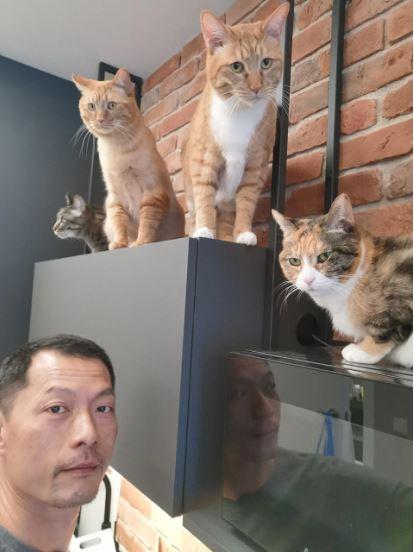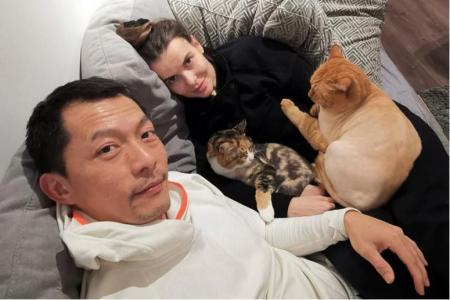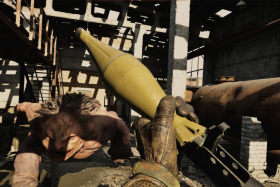Ix Shen's wife and four cats keep him going in Ukraine
Animals, exercise and sunshine. Those are the main things that have helped Ix Shen cope mentally after more than 100 days of the war in Ukraine.
In March, the 50-year-old Singaporean and his Ukrainian wife Natalia left their home in the capital of Kyiv and evacuated to Krakow, Poland, for safety reasons.
Since April, he has been shuttling between both countries weekly as part of his work in providing humanitarian aid as a volunteer with a non-profit organisation.
And he alternates doing so with Natalia, a traditional Chinese medicine (TCM) practitioner and medical officer with a Ukrainian reserve unit who is in her late 30s.
As the military threat in Kyiv has diminished, she no longer needs to be on standby.
Due to her connections with doctors, she helps Shen verify which hospitals in Ukraine require assistance when it comes to medicine, pharmaceutical supplies and medical equipment.
When asked why the couple - who have been married for seven years and have no children - decided on this arrangement, which requires them to sometimes spend weeks apart, Shen tells The Straits Times with a chuckle: "Well, that's because we have four cats and it was quite an adventure to move them out of Kyiv.
"It's really difficult to travel with cats between countries, so we have to take turns to come out to Ukraine. Any trip has to be done individually because someone must stay home to look after the cats."
He speaks with great affection about his furkids, crediting them with helping him to stay sane during the early part of the Russian invasion.
"Cats are intuitive, they don't get traumatised by information," he muses.
"They help you get better bearings when things go boom - quite literally. Information can sometimes help you, but also harm you, because you are no longer listening to your survival instinct and decision-making becomes conflicted.
"Once you can manage your panic, everything else falls into place."

With spring turning into summer in Ukraine now, Shen enjoys being outdoors in the sun during his downtime to alleviate stress, whether it is walking in the park, going for a run or working out using the public exercise machines.
The former actor, who is still in the film business, ventured to Beijing, China, in 2009 to further his career and was the executive director of the hit action flick Wolf Warrior 2 (2017).
Natalia was studying TCM there and they reportedly met online through an international site for avid travellers.
Being separated for long periods is something the couple - who moved to Ukraine late in 2021 with their cats - have become used to.
Shen, who is currently reporting exclusively for The Straits Times on the Ukraine situation, says: "When we were in China, part of my job was project-based, so being away from home is something we learnt to adapt to."
While he agrees that any crisis tests relationships, weathering the Covid-19 pandemic and Ukraine war back to back was also an opportunity to strengthen their marriage.
He says: "If Covid-19 helped us discover our bonds, then the war helped them grow to a different level and bring us closer.
"It's never easy to overcome life, so to be able to do it with someone, that is something to be cherished."
Shen is no mushy, gushy romantic, but does exhibit a thoughtful, softer side when talking about what he loves about and appreciates in his life partner.
He says: "She helps me understand what kind of person I could be - and can't be. We all have our insecurities and overconfidence, and sometimes we need to have the right person to hold a mirror to us at the right time.
"And she is that person for me."
He also misses the simple things from their brief time in Kyiv, like walking in the snow or looking at flowers together. "When you live in a place where there are seasons, and if you don't experience such things there and then, you have to wait another year."
When the situation stabilises, he may look further ahead.
He adds: "The only plan I dare to indulge in for myself is to go on a beach holiday. Before the war, we were thinking of Egypt as it's nearer and the only place that was available then (due to Covid-19 border restrictions). It would be lovely to go for that."
But right now in Kyiv, Ukrainians are "just trying to have a normal life" as much as possible.
In May, he spotted huge crowds queueing outside the Central Post Office to buy the reissued commemorative stamp featuring a Ukrainian border patrol guard showing a sinking Russian warship the middle finger, of which one million pieces had sold out earlier.
He recalls marvelling at the sight because it happened during an air raid and the shelter is next to the building.
"People refused to move because they had been queueing for so long.
"The stamp, which is about standing up to the big bully, means a lot to the Ukrainians. So their attitude and behaviour were what this stamp symbolises."
For now, Shen hopes support from the rest of the world for the war effort will be more "resolute", but accepts that life will continue to be put on hold for another 100 days or longer.
He says: "Right from the start, Ukraine did not have the necessary military hardware to oust the invaders, so anyone who expected a quick outcome was prepared for Ukraine to lose its sovereignty.
"But if it's important to you, then you would never have expected it to be a short conflict.
"My biggest takeaway after 100 days, especially as a Singaporean, is that independence should never be taken for granted."
Get The New Paper on your phone with the free TNP app. Download from the Apple App Store or Google Play Store now


